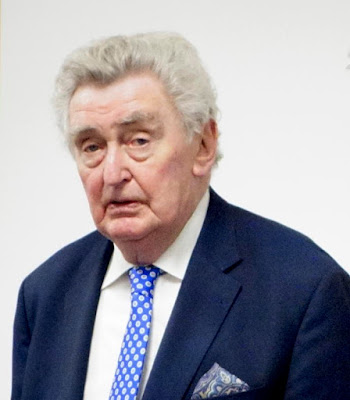Irish speakers, interpreters and the courts, 1754–1921 by Mary Phelan and published by Four Courts Press and the Irish Legal History Society (ILHS), was launched in the John & Aileen O'Reilly Library in DCU on 22/1/2020.
Dorothy is Professor in the DCU School of Applied Language and Intercultural Studies and she did the welcome warm up.
Patrick, operating in this context as President of ILHS, stressed the interdisciplinary and ground-breaking nature of Mary's research.
Úna, who was a judge in the High Court and has recently been appointed to the Appeals Court, gave a stunning speech which included extensive and well selected passages from the book, interlaced with comments based on her own knowledge of the law and her own legal and judicial experience.
It was a fascinating recital, the more so as she herself has dealt with cases involving the Irish language.
I'll just mention two points here.
She raised the question of whether the demise of the Irish language came about through neglect or enemy action by the British administration. I think she was being overgenerous to even raise the question. The extracts she quoted were unambiguous.
She also remarked on the difference between now and then which you'd want to keep in mind when reviewing the period. Today there are no adult monoglot Irish speakers whereas at the beginning of the period covered by the book they were widespread in the countryside.
Such interpretation services as were offered in those days were in the interest of comprehension and, purportedly, fairness in the justice system. Today's interpretation services, at least as far as the Irish language is concerned, are less about due process and more about language rights, arising from the position of Irish in the constitution as the State's first language. This is quite a different ballgame.
You can read some more of Úna's observations here.
Someone, who shall be nameless, commented that her speech was a bit on the long side. I'd have listened to her all night.
Mary, modestly, told us how she came to write the book while not being a lawyer herself. She is involved in the area covered in the book as an academic and lecturer. The book came off the back of a PhD thesis provoked in part by her chasing up her family history.
She has diligently drawn together material from sources which are spread all over the place. Aggregating her results allowed her to draw novel conclusions on a broader scale than hitherto. Hence Patrick's reference to groundbreaking.
A well deserved joint photo op.
Sales of the book moved well on the night and, in addition, ILHS members get a "free" copy as part of their membership.
Úna in animated conversation with former Chief Justice Ronan Keane who was present but did not speak.
It's really quite a small world.
When I asked him if he'd sign my copy of the book, his reaction was that this mightn't be appropriate as he could claim no credit for it.
Not wanting to lose out I had to remind him of my, inconsequential, connections with himself.
He had launched the 1997 volume of the Proceedings of the Blackrock Society, in which I featured and on which he commented at the time. "That was a long time ago" said he.
And then there was the O'Flaherty case before the Supreme Court, of which he was then President, and which I attended on behalf of the State. "I think I was involved in that one" he said.
He then signed my copy of the book.
Just in passing, if you are interested in Denis Riordan who took the O'Flaherty case, and many others, against the State, you can read about him and his Wunder Orders here.
And then there's Patrick, who will be having me on his Talking History show on Sunday (26/1/2020) going on about my grand-uncle PJ Medlar, City Councillor and Undertaker in the Liberties many moons ago.
A very small world.
All in all, a most stimulating evening.











No comments:
Post a Comment
Bona fide comments only. Spamming, Trolling, or commercial advertising will not be accepted.